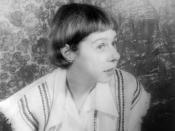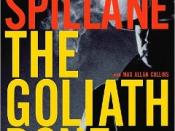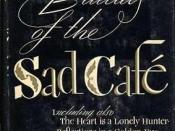The longing to communicate and the difficulty of ever properly communicating, the delusions attendant upon the human need to love: the themes could hardly be presented more explicitly than in The Ballad of the Sad Café (indeed, the existence of a triangular relationship between personal feeling, regional landscape, and moral reference is virtually insisted upon) and this does, naturally, tend to carry its own dangers with it. The "message" may, as a result, seem a little too pat to be convincing, too limited and limiting even for the purpose of fable.
The figures inhabiting them possess a special kind of resonance, that sense of roots and a definite history which marks them out as the descendants of recognizable southern types. They have the substance and immediate credibility of people long brooded over, and so well understoodÃÂand to this is added that freshness, the sense of surprise and valuable discovery, which can only come when someone as well known as this is seen from a radically altered standpoint.
We may suspect, while we read a McCullers story, that we have seen characters like hers before. But until now, she makes us feel, we have never been properly acquainted with them: there is something about them, some crucial side of them we have somehow managed to miss.
The major characters in The Ballad of the Sad Café offer a perfect illustration of this, the way in which the familiar is suddenly turned into the strange and new. And the nature of their familiarity, at least, is suggested by a bare summary of the Ballad's plot, which is like something borrowed from the comic legends of the old Southwest. There is a kind of crazy, comic logic of frustration behind everything that happens: the beloved is always turning away from the lover to create a false idol of his or her own. So "Miss Amelia" Evans, the central character and the owner of the "terrible, dim" face which appears in the opening portrait of the town, refuses the love of her husband, Marvin Macey, and, having done so, falls in love with a newcomer to the district, the hunchback "Cousin" Lymon.Cousin Lymon, in turn, despises Miss Amelia and worships Marvin Macey - who despises him. Nobody gets what he wants in the story. Everybody is thwarted and, in the process, made to look utterly grotesque. This, for example, is how Miss Amelia is described before the charade has properly begun:She was a dark, tall woman with bones and muscles like a man. Her hair was cut short and brushed back from the forehead, and there was about her sunburned face a tense, haggard quality. She might have been a handsome woman if, even then, she was not slightly cross-eyed.
By reducing her appearance to a series of conflicting angles, by emphasizing her physical defects and her masculinity (or, rather, her sexual ambivalence), McCullers effectively transforms Miss Amelia into a freak here. We are distanced from Miss Amelia, made to inspect her and her country home with a clinical detachment, and then invited to consider her frustrations, such as they are - her utter failure to realize her ambitions in her given world - as at the very least potentially comic. As if to confirm McCullers's debt, there is even an epic fight at the end of the Ballad, between Miss Amelia and Marvin Macey, which in its combination of the macabre and the grotesque (Macey greases himself, for instance, so that he can keep slipping through Miss Amelia's fingers) must remind us of those almost operatic trials of strength which enliven so many of the tales of the southwestern school.
That is not the whole story, though. Miss Amelia is a grotesque, perhaps, but she is a grotesque for the same reason that most of McCullers's subjects are - because, as the author herself once put it, her "physical incapacity" is being used primarily as "a symbol of [her] spiritual incapacity ... - [her] spiritual isolation." She is not just the comic loser, nor is she economically deprived. She is, to use that word again, "lonesome," and her lonesomeness is intended eventually to figure our own. Like an image seen in a carnival mirror, she is meant to offer us an exaggerated, comically distorted, and yet somehow sadly accurate reflection of ourselves.
Works Cited: McCullers, Carson. "The Ballad of the Sad Cafe" and Other Stories. New York: Houghton Mifflin, 1951; rpt. 1971.






Cofee Ballad
Description is bit short but nonetheless it gives you a rough idea of what the Ballad of the Sad Café is about.
0 out of 0 people found this comment useful.